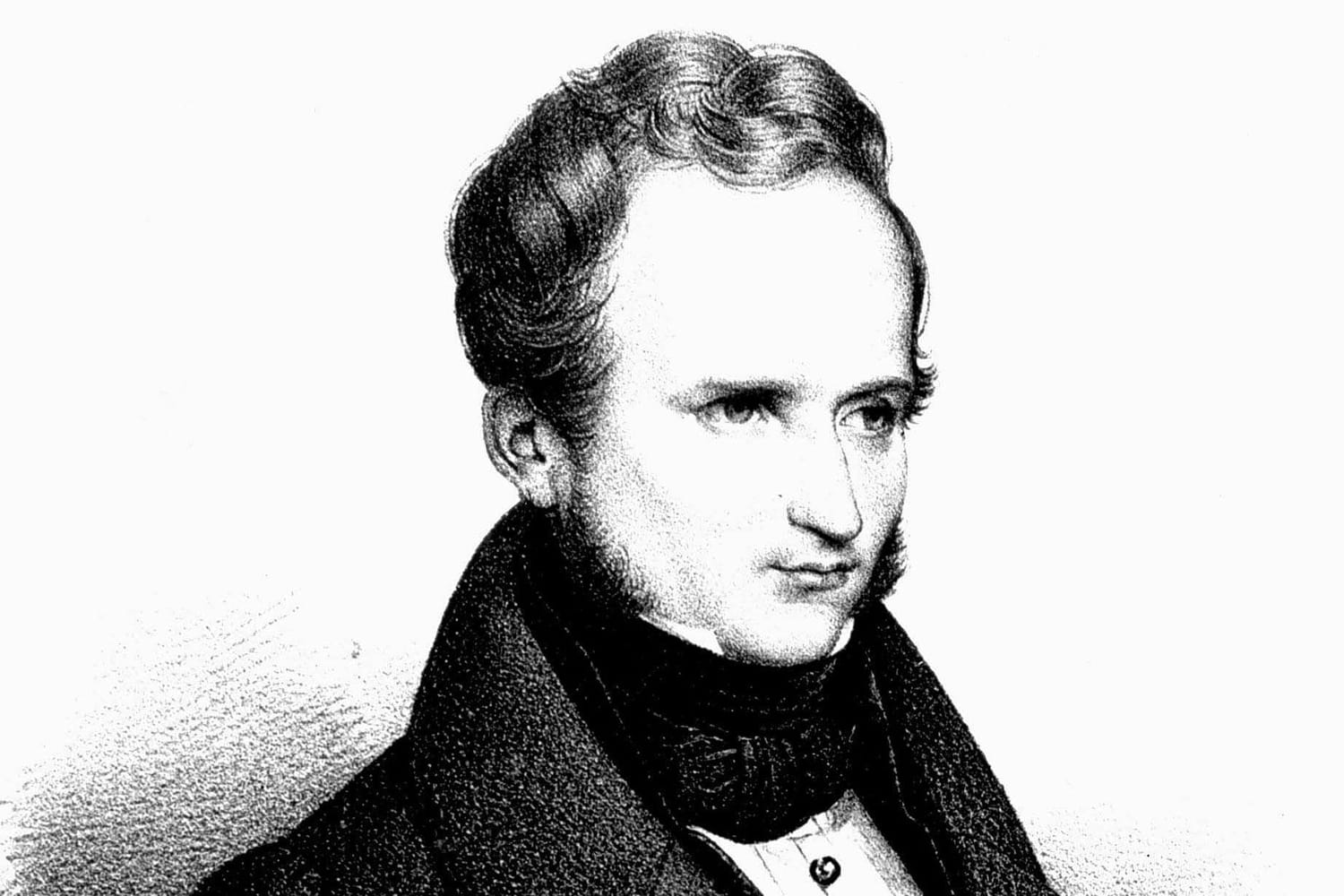Alfred de Vigny (1797-1863) was a French poet, dramatist, and novelist who wrote some of the greatest works of the Romantic period. Born in Loches, France, he was the son of a French officer. He was educated in Paris and served in the French army for seven years, rising to the rank of captain. After leaving the army, he devoted himself to writing and published his first poem in 1820. His works, including the plays Chatterton and Cinq-Mars, and the novels Servitude et Grandeur Militaire and Stello, explore the themes of love, honor, and patriotism. He is remembered as one of the major figures of French Romanticism.
Early Life of Alfred de Vigny
Alfred de Vigny, the French poet, playwright, and novelist, was born on March 27, 1797 in Loches, France. His father, Claude-Joseph de Vigny, was a retired army captain, and his mother, Anne de St. Maurice, was a noblewoman. His parents were both from aristocratic families and his father had served in the Seven Years’ War. Growing up in a wealthy and influential family, Alfred had access to a great education. He attended the Lycée Louis-le-Grand in Paris, and while there, he wrote his first play, which was performed at the Comédie-Française in 1816. Later, he studied at the École Polytechnique before entering the military academy of St. Cyr. In 1819, he graduated as an army officer.
The early years of Alfred de Vigny’s life were marked by a strong sense of patriotism and service to his country. He was an active participant in the Napoleonic Wars, and he was even decorated for his bravery. He continued to write during this period, and he even wrote a memoir of his time in the military. In 1824, he published his first book, La Maison du Berger, a collection of poems. This was followed by a number of other works, including plays and novels, which he wrote in both French and English. These works would eventually garner him great acclaim and recognition in the literary world.
Education and Early Career
Alfred De Vigny was born in 1797 in Paris, France. He was educated at the Lycée Louis-le-Grand and then at the École Polytechnique. After graduating, he was appointed to the Corps des Mines, and he worked for two years as a civil engineer in the military. Later, in 1825, he resigned from the Corps des Mines and decided to pursue a career as a writer. He published several collections of poetry and several plays, and his novel Cinq-Mars was a great success. He received a prestigious literary prize for his work. De Vigny was a true Renaissance man, and his influence was far-reaching. He was a leader in the Romantic literary movement, and his works were widely read and admired. He was also an important figure in French politics, and he was a staunch defender of the Bourbon monarchy. In his later years, he wrote some of the most influential works of the French language, such as his epic poem La Marche de Radetsky. De Vigny passed away in 1885, leaving behind a rich and lasting legacy.
Writing Career
Alfred De Vigny’s writing career was nothing short of extraordinary. His poetic works have been praised for their insight into human emotion and his plays for their moving portrayals of complex characters. His novels are renowned for their vivid descriptions of 19th-century France and his lyrical works have been praised for their beauty and elegance. He was also a master of the essay and wrote extensively on politics, history, and culture.
De Vigny was strongly influenced by the French Romantic Movement, and in his works he explored themes of love, death, and freedom. His most famous works include La Maison du Berger, a pastoral drama, and La Marche Funèbre, a funeral march. Other works of note include La Maréchale d’Ancre, a tragedy, and Le Château de Chillon, a historical drama.
De Vigny’s writings were greatly admired by his contemporaries, and he was considered to be one of the great French poets of his time. He was elected to the Académie Française in 1845 and was awarded the Legion of Honor in 1847. Though his career was not without its difficulties, De Vigny left behind a remarkable literary legacy.

Impact and Legacy
Alfred De Vigny was a key figure in the development of French Romanticism, and his work has left a lasting impression on the literary world. He was a prolific writer, having penned numerous plays, novels, and poetry collections. He was also a philosopher, and his works explored the complex relationship between man and nature, and man and society. His works also had a huge influence on the development of modern French literature. As an influential figure of the Romantic era, De Vigny’s works have been studied and discussed by many literary theorists, and his influence on modern literature is still felt today. His works have been adapted into numerous films and plays, and his legacy continues to live on in the works of modern authors. De Vigny’s works have inspired generations of French writers, and his impact on the literary landscape is undeniable.
Personal Life
Alfred De Vigny (1797-1863) was a French writer, poet, and playwright who is considered one of the most important figures in 19th century French literature. He is best known for his novel Cinq-Mars and his plays La Maréchale d’Ancre and Les Destinées. While he was highly respected as a writer during his lifetime, his life was not without its difficulties.
Born in Loches, France, De Vigny was the son of a Royalist officer. He was educated at the Lycée Louis-le-Grand and then joined the French army, serving in the Napoleonic campaigns. In 1816, he was wounded in battle and retired from the service. He then devoted his time to writing, producing a number of works of poetry, fiction, and drama.
De Vigny was married twice, first to Louise de Solvigny and then to a cousin, Marie de Solvigny. He had several children and a tumultuous relationship with his wife, though his writing was never affected by his domestic life. He was an active participant in the literary salons of Paris and enjoyed the company of many of the most influential writers and intellectuals of the day. He was awarded the Légion d’honneur in 1844, shortly before his death in 1863.
Major Works of Alfred de Vigny
Alfred de Vigny was a 19th century French poet, dramatist, and novelist. He is considered one of the greatest French Romantic writers and his works are characterized by their emotional intensity and lyrical beauty. Some of his most notable works include “Servitude et Grandeur Militaires”, “Cinq-Mars”, and “Le Cor”.
“Servitude et Grandeur Militaires” is considered one of Vigny’s most notable works and explores the effects of the Napoleonic Wars on French soldiers’ emotions and mental well-being. Written in 1835, the poem was praised for its vivid descriptions of the horrors of war and its exploration of the effects of military service on the human psyche.
“Cinq-Mars” is a historical novel set during the reign of Louis XIII. It follows the story of François de Cinq-Mars, who attempts to overthrow the king and install his own regime. The novel is noted for its detailed descriptions of the period, and for its exploration of the consequences of ambition and power.
“Le Cor” is a poetic drama which Vigny wrote in 1828. It tells the story of a poor shepherd who is persecuted by the forces of an oppressive government, and is ultimately forced to flee. The poem is noted for its exploration of the human condition, its vivid imagery, and its powerful anti-authoritarian message.
Overall, Alfred de Vigny is considered one of the greatest French Romantic writers of all time. His works are noted for their emotional intensity, their lyrical beauty, and their exploration of the human condition. His most notable works include “Servitude et Grandeur Militaires”, “Cinq-Mars”, and “Le Cor”.
FAQs About the Alfred De Vigny Biographie Courte
1. Who was Alfred De Vigny?
Alfred De Vigny was a French poet, playwright and novelist who was part of the Romantic movement in French literature. He was born in 1797 in Loches, France and died in 1863.
2. What works of literature did Alfred De Vigny create?
Alfred De Vigny wrote several plays, novels and poetry collections, including Cinq-Mars, Servitude et Grandeur Militaire, Poèmes Antiques et Modernes, and Stello.
3. What awards did Alfred De Vigny receive?
Alfred De Vigny was honored with the prestigious Grand Prix de l’Académie Française in 1845. He was also inducted into the French Academy in 1845.
Conclusion
Alfred de Vigny was a renowned French poet, playwright, and novelist whose works were deeply rooted in the Romanticism of the 19th century. He wrote many acclaimed works such as Servitude et Grandeur Militaire and Chatterton. His works often explored personal themes like duty, love, and death. His legacy has left a lasting impression on French literature and inspired generations of writers.




